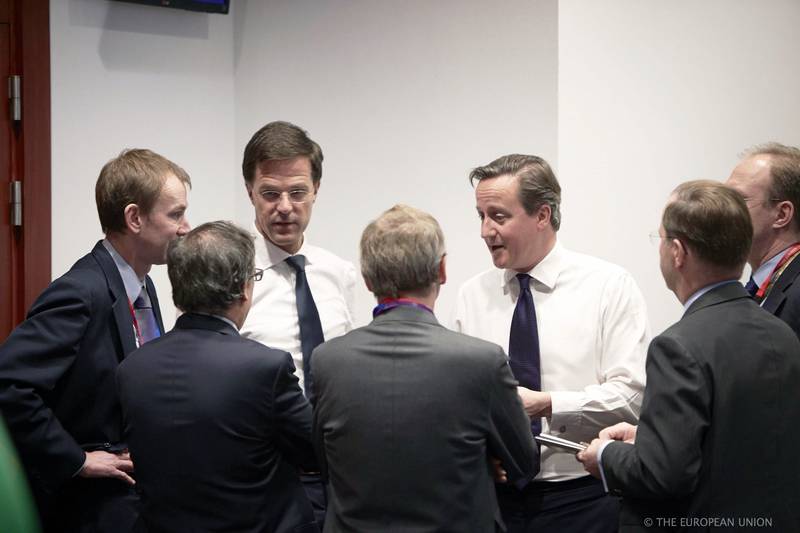Germany: We Need a Decision on the Financial Transaction Tax by June
Ralitsa Kovacheva, March 14, 2012
 The dispute on the introduction of a financial transaction tax (FTT) in the EU has been stuck for months. The pros and cons have not changed, although some countries have moved from the camp of tax opponents to the supporters' side. The only news from the latest discussion on the topic in the Council of EU finance ministers on 13 March is that Germany has set a deadline for reaching an agreement. If we do not agree on the introduction of a FTT across the EU under the Danish Presidency (the end of June), we are obliged to look for alternatives, German Finance Minister Wolfgang Schaeuble said. There was no high emotional degree or swords crossing, as we witnessed during the first discussion on the issue in November 2011, organised by the Polish Presidency. Rather, both camps are involved in a trench warfare, while seeking a roundabout way to the goal.
The dispute on the introduction of a financial transaction tax (FTT) in the EU has been stuck for months. The pros and cons have not changed, although some countries have moved from the camp of tax opponents to the supporters' side. The only news from the latest discussion on the topic in the Council of EU finance ministers on 13 March is that Germany has set a deadline for reaching an agreement. If we do not agree on the introduction of a FTT across the EU under the Danish Presidency (the end of June), we are obliged to look for alternatives, German Finance Minister Wolfgang Schaeuble said. There was no high emotional degree or swords crossing, as we witnessed during the first discussion on the issue in November 2011, organised by the Polish Presidency. Rather, both camps are involved in a trench warfare, while seeking a roundabout way to the goal.
One of the possible alternatives, which Wolfgang Schaeuble is talking about, is the  so called enhanced cooperation, which provides for a group of EU countries (at least nine) to introduce the tax. In February, precisely nine countries sent a letter to the Danish presidency calling on it to accelerate negotiations on the FTT, so an agreement at first reading to be reached by the end of June. The letter is signed by France, Germany, Italy, Belgium, Austria, Finland, Spain, Portugal and Greece. The problem is that Germany and France want the FTT to be introduced in the euro area as a whole, which at this stage seems impossible. Ireland is opposed with the completely logical argument that if Britain does not apply the tax, businesses can easily move from Dublin to London.
so called enhanced cooperation, which provides for a group of EU countries (at least nine) to introduce the tax. In February, precisely nine countries sent a letter to the Danish presidency calling on it to accelerate negotiations on the FTT, so an agreement at first reading to be reached by the end of June. The letter is signed by France, Germany, Italy, Belgium, Austria, Finland, Spain, Portugal and Greece. The problem is that Germany and France want the FTT to be introduced in the euro area as a whole, which at this stage seems impossible. Ireland is opposed with the completely logical argument that if Britain does not apply the tax, businesses can easily move from Dublin to London.
Other eurozone countries are also not enthusiastic about the idea. I’m asking myself is it wise to introduce such a tax, knowing that it is not implemented in USA and other global financial centres, is it right to implement it in a limited number of EU countries if it is not implemented in big EU financial centres as London, Luc Frieden, Luxembourg Finance Minister asked rhetorically. Italian Prime Minister and Finance Minister Mario Monti expressed concern about the economic impact of FTT and urged the matter be examined thoroughly. Italy supports the tax, but if it is introduced at European level. Although formally having a neutral position, the Netherlands also highlighted strong arguments against FTT, based on studies conducted by its national supervisors.
 The UK, of course, is still firmly against the FTT as proposed by the European Commission in October 2011. London has even invited the EU to implement its model of stamp duty, that generates revenue of 2 billion pounds a year. The other country strongly opposing the tax is Sweden. We don`t like the FTT and don`t want it at European level, Swedish Finance Minister Anders Borg stated. Stockholm is not only against the proposed model of the tax, but it does not agree with the introduction of a common European tax to fill the EU budget. Poland opposed to this, arguing that according to the EU treaty the EU budget was supposed to be financed by resources of its own.
The UK, of course, is still firmly against the FTT as proposed by the European Commission in October 2011. London has even invited the EU to implement its model of stamp duty, that generates revenue of 2 billion pounds a year. The other country strongly opposing the tax is Sweden. We don`t like the FTT and don`t want it at European level, Swedish Finance Minister Anders Borg stated. Stockholm is not only against the proposed model of the tax, but it does not agree with the introduction of a common European tax to fill the EU budget. Poland opposed to this, arguing that according to the EU treaty the EU budget was supposed to be financed by resources of its own.
The Czech Republic and Malta also expressed once again negative opinions on the  tax. Bulgaria did not take the floor during the discussion on 13 March, but euinside has learnt from two independent high-level sources that the Bulgarian position has softened and has changed from firmly against to 'we may agree if there is a common agreement.' Despite our persistent attempts, to date we have not received an official response from the finance ministry whether this is the case. However, against the backdrop of the negligible probability a consensus to be achieved on the matter, this position is quite convenient. Moreover, Bulgaria will not suffer any losses from the introduction of FTT as there is no developed financial sector in the country. Such is the case of Slovakia, which after the electoral victory of the Social Democrats announced its support for the FTT, according to the German magazine Der Spiegel.
tax. Bulgaria did not take the floor during the discussion on 13 March, but euinside has learnt from two independent high-level sources that the Bulgarian position has softened and has changed from firmly against to 'we may agree if there is a common agreement.' Despite our persistent attempts, to date we have not received an official response from the finance ministry whether this is the case. However, against the backdrop of the negligible probability a consensus to be achieved on the matter, this position is quite convenient. Moreover, Bulgaria will not suffer any losses from the introduction of FTT as there is no developed financial sector in the country. Such is the case of Slovakia, which after the electoral victory of the Social Democrats announced its support for the FTT, according to the German magazine Der Spiegel.
 The Danish EU Presidency synthesised the main "sensitive issues" where work should continue as follows: the tax base (to cover currency derivatives and government bonds, as well as pension schemes); structure of the rates and persons liable to tax; impact on economy and risks of relocation outside of the EU; enforcement of the directive vis-à-vis non-EU financial institutions.
The Danish EU Presidency synthesised the main "sensitive issues" where work should continue as follows: the tax base (to cover currency derivatives and government bonds, as well as pension schemes); structure of the rates and persons liable to tax; impact on economy and risks of relocation outside of the EU; enforcement of the directive vis-à-vis non-EU financial institutions.
The latest discussion on the topic in the economic committee (ECON) of the European Parliament has also shown strong divisions among the main political groups. The ECON Committee must decide on the matter in April and the European Parliament will vote on its position in June. Until then, the distribution of powers in the Council of Ministers should also be clear. Obviously, consensus will depend on the ability of the Commission and the Danish Presidency to offer not just a compromise, but "alternatives." At this stage it is unclear whether, in addition to a Plan B for enhanced cooperation, we can expect changes in the very model of FTT, as proposed by the Commission. It is telling, however, that "alternatives" was the most used word at the meeting of the finance ministers, including by Germany and France.
 Kristalina Georgieva | © Council of the EU
Kristalina Georgieva | © Council of the EU Mark Rutte, David Cameron | © Council of the EU
Mark Rutte, David Cameron | © Council of the EU | © European Parliament
| © European Parliament | © European Parliament
| © European Parliament | © The Council of the European Union
| © The Council of the European Union | © European Parliament
| © European Parliament